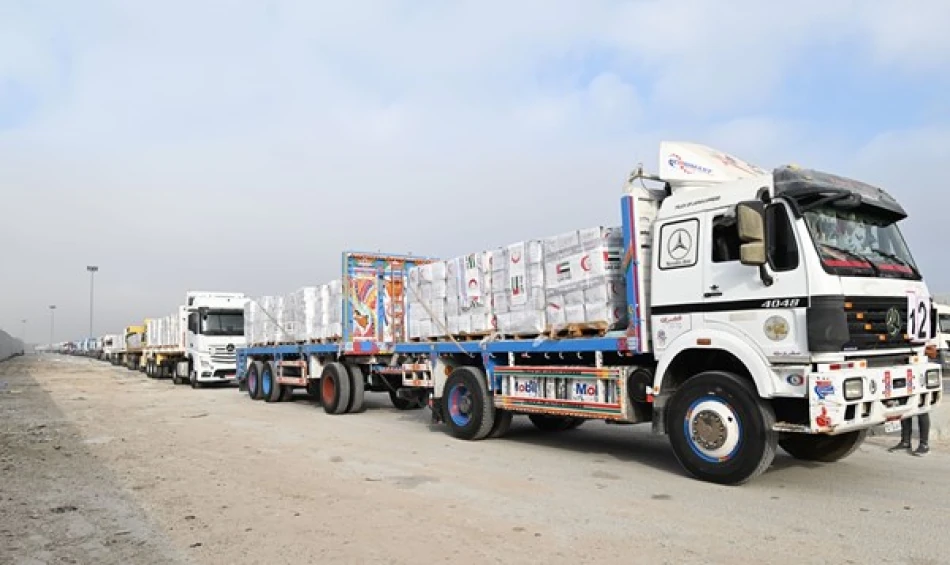
UAE Delivers 38 Trucks of Humanitarian Aid to Gaza in 'Noble Knight 3' Operation
UAE Launches Major Water Infrastructure Project for Gaza Amid Renewed Humanitarian Push
The United Arab Emirates has significantly escalated its humanitarian intervention in Gaza, deploying specialized equipment for a ambitious 7-kilometer water pipeline that will deliver 2 million gallons daily to displaced populations. The infrastructure project, part of the UAE's "Operation Chivalrous Knight 3," represents one of the most substantial utility interventions by a Gulf state in the Palestinian territory, signaling a shift from emergency aid to longer-term infrastructure support.
Massive Equipment Convoy Enters Gaza
A 38-truck convoy crossed into Gaza through Egypt's Rafah border crossing today, carrying a dual payload of immediate relief supplies and critical infrastructure equipment. The convoy included 18 trucks loaded with food aid, medical supplies, and infant formula, alongside 20 specialized vehicles transporting pipes, tanks, and technical equipment for the water pipeline project.
Combined with yesterday's 25-truck delivery of water infrastructure materials, the UAE has now moved 45 trucks worth of pipeline equipment into Gaza. Officials confirmed that all necessary equipment has been delivered and the project is ready for implementation.
Strategic Water Pipeline to Transform Access
Technical Specifications and Impact
The planned water pipeline will stretch 7 kilometers from a UAE-operated desalination plant in Egypt to displacement areas between Palestinian Rafah and Khan Younis. With a capacity of 2 million gallons per day, the system could serve hundreds of thousands of displaced Palestinians who have faced severe water shortages throughout the current crisis.
This infrastructure approach mirrors successful Gulf state interventions in other conflict zones, where the UAE has previously established utilities in Yemen and Syria. Unlike temporary aid distributions, fixed infrastructure creates sustainable resource access that can operate independently of daily convoy deliveries.
Broader Regional Implications
The UAE's infrastructure investment in Gaza represents a significant diplomatic and humanitarian precedent. While other Gulf states have provided financial aid and emergency supplies, the UAE's commitment to cross-border utility infrastructure suggests a longer-term strategic engagement with Palestinian territories.
This approach contrasts with traditional aid models focused on consumable supplies, instead creating permanent infrastructure that could outlast immediate crisis periods. The project also demonstrates how Gulf states are leveraging their technical expertise and financial resources to address humanitarian crises beyond their immediate borders.
Multi-Channel Aid Strategy
Beyond the water infrastructure project, the UAE has resumed its "Birds of Goodness" aerial supply drops while simultaneously maintaining ground convoys through Rafah. This multi-vector approach maximizes aid delivery capacity and reduces dependence on any single distribution method.
The coordinated land and air operations reflect lessons learned from previous humanitarian interventions, where diversified delivery methods proved more resilient to logistical disruptions and border complications.
Setting New Standards for Gulf Humanitarian Intervention
The UAE's Gaza water project establishes a new benchmark for Gulf state humanitarian engagement, moving beyond traditional charity models toward infrastructure investment. This approach could influence how other wealthy nations structure long-term humanitarian assistance, particularly in protracted crisis situations where temporary aid proves insufficient.
For international observers, the project demonstrates how middle powers can leverage technical capabilities and financial resources to address humanitarian crises through sustainable infrastructure rather than perpetual emergency aid cycles.
Most Viewed News

 Layla Al Mansoori
Layla Al Mansoori






